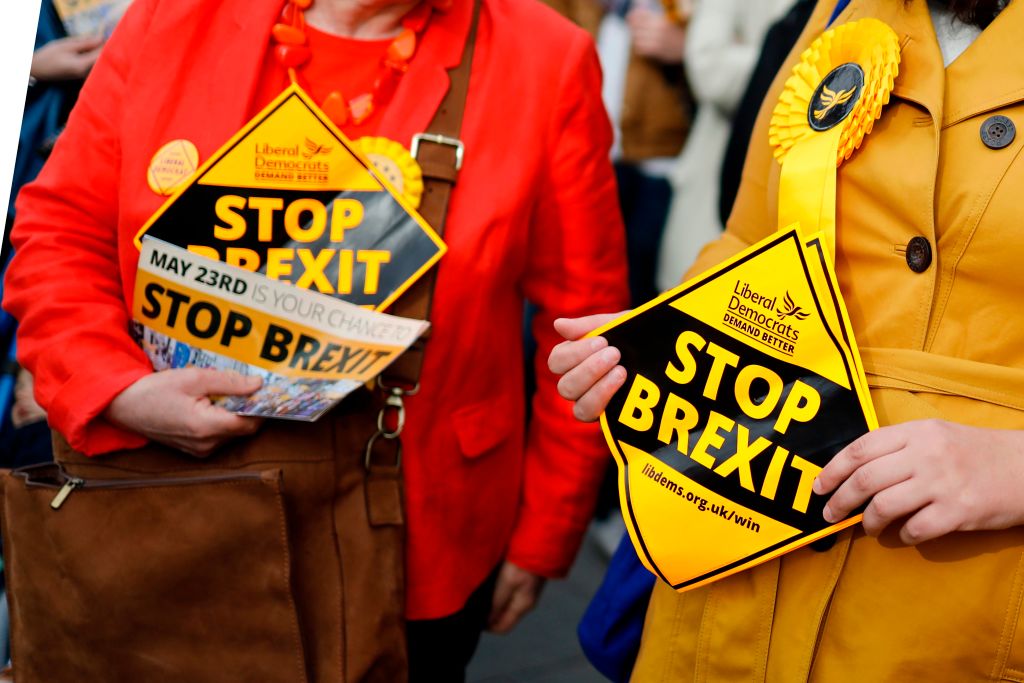Politicians determined to prevent a no-deal Brexit are locked in a Mexican stand-off. If Boris Johnson cannot command a Commons majority, Jo Swinson has made it clear that under no circumstances will Liberal Democrats support a caretaker Jeremy Corbyn-led Labour government. John McDonnell has indicated that Labour will not back a temporary national unity government under an as-yet unnamed backbench MP. With Parliament in recess we are in the realm of second-guessing what might happen next.
When MPs return to Westminster, Johnson might win a vote of confidence. But even if he loses, the Prime Minister could possibly engineer a general election to subvert the cunning plans of the no-no Dealers.
The war of words now being waged between Lib Dems and Labour’s Corbyn leadership might therefore turn out to be moot. But whatever the future holds, this dispute is not inconsequential. It reveals that, despite everything they say, there is something more important at stake than preventing a no-deal Brexit.
For the ultimate prize coveted by Swinson and Corbyn is the right to lead the opposition to the Conservatives and – who knows? – come out the victor after the election everybody assumes will be held this autumn. This is the prize Liberals took for granted until the 1920s since which time it has been Labour’s to hold aloft. But is it about to change hands once more? The next few months will likely decide that issue.
Historians once debated whether Labour’s rise and the Liberals’ fall was inevitable. Some argued that in the Edwardian period a new reformist Liberalism had integrated Labour within a ‘progressive alliance’. They claimed that had the First World War not split Liberals between supporters of David Lloyd George and the man he supplanted as coalition prime minister, party leader Herbert Asquith, centre-left politics would have taken a different shape. It was Liberal division that allowed Labour to become a fully independent national party. Other historians however contend that this was irrelevant. Britain was a class society with an increasingly powerful trade union movement: Labour’s displacement of the Liberals was inescapable.
Perhaps both were wrong. For the truly fateful period was immediately after the collapse of the Lloyd George coalition in 1922, following which came a period of intense three-party competition with four elections held between 1922 and 1929. In such circumstances, ones much like our own just now, the first-past-the-post electoral system was like the national lottery: three relatively evenly matched parties meant the outcome of these contests was uncertain.
So far as whether the Liberals or Labour prevailed as the Conservatives’ main opponent, the most critical of these was the election of 1923. Despite still being at loggerheads, the Liberals won 29.7 per cent of the vote and 158 seats: they held the balance of power between the Conservatives and Labour.
Asquith might have attempted to form a minority Liberal government; support the Conservatives, who had lost seats; or back Labour, which had gained ground. His party’s strength lay in rural and suburban areas but it still enjoyed an important foothold in working-class districts: all was still to play for.
But Asquith took the path which the historian Roy Douglas described as: ‘the most disastrous single action ever performed by a Liberal towards his party’ by joining with Labour in a vote of no confidence against the Conservative government. This led the King to call for Ramsay MacDonald, as leader of the second biggest party, to form an administration. If the Labour government lasted just a few months, Asquith’s decision did irreparable damage to his party: the 1924 election saw the Liberals reduced to 40 seats. Labour was now unquestionably the second party of government, a position it has retained – until, perhaps, 2019.
Lib Dems have Corbyn’s mishandling of Brexit to thank for their present resurgence, one that saw them overtake Labour in the recent European elections, a position some opinion polls suggest they have consolidated. If Swinson has a few critical decisions to make in the near-future she has already made one by describing Corbyn as ‘not only dangerous for our national security but for our economic security too’. It is unlikely that she will follow the same path as Asquith and ever put a Corbyn-led Labour party into power.
But unless the Lib Dems command a Commons majority, after the next election her choices are limited and all are risky. If Asquith’s decision to back Labour hurt his party, taking the Lib Dems into coalition with the Conservatives did not prove one of Nick Clegg’s brighter ideas. But while Swinson faces some tricky decisions she at least leads a united party. Corbyn’s Labour is, in contrast, hardly harmonious. Indeed, her opposition to Corbyn personally – rather than Labour as a party – is probably intended to encourage some of his MPs to jump ship.
Corbyn can also not rely on class sentiment to ensure he prevails over the Lib Dems. If some historians believe that was the force behind Labour’s rise and the Liberals fall, political scientists now tell us party affiliations are in flux and it is generation which now shapes voting intentions.
History never repeats itself, either as tragedy or farce, but looking back to the 1920s suggests that the fate of our political parties can sometimes rest on the key decisions of a few men – and women. Over to you Jo.
Steven Fielding is professor of political history at the University of Nottingham






Comments